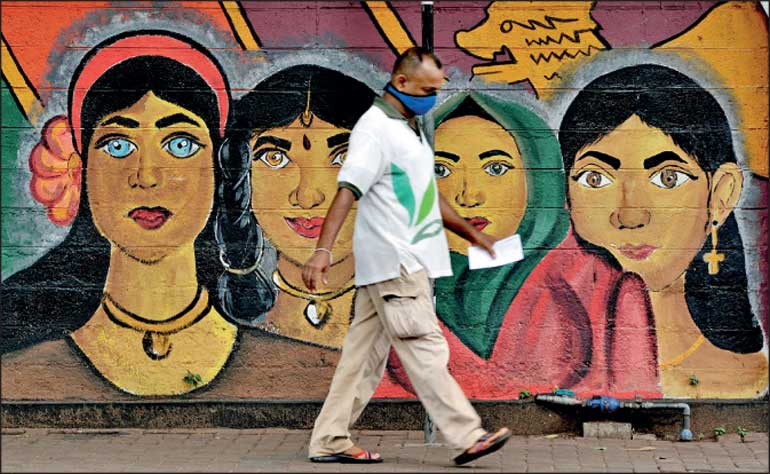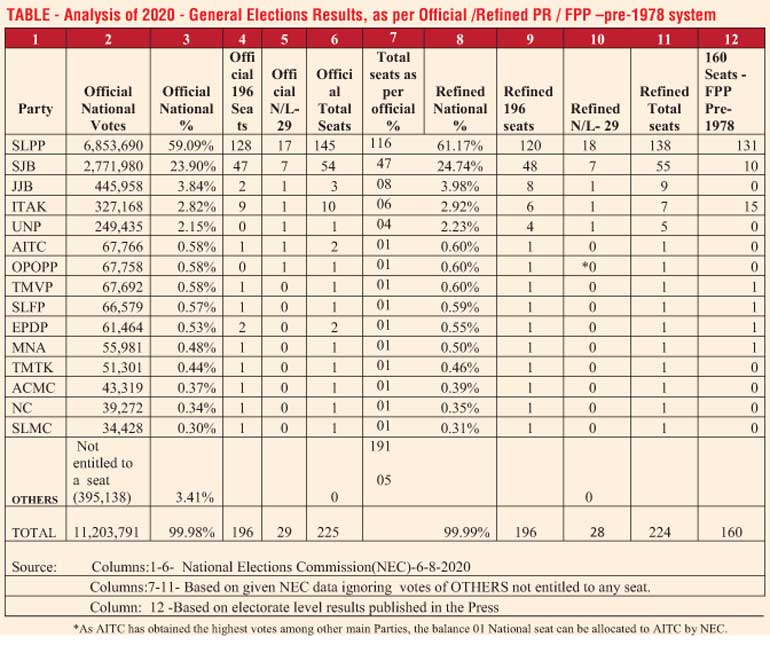Tuesday Feb 24, 2026
Tuesday Feb 24, 2026
Saturday, 9 October 2021 00:10 - - {{hitsCtrl.values.hits}}

As a small and democratic country, we should be able to exhibit the simplicity, rationality, accuracy, transparency and credibility of our electoral process as a model to the world at large rather than copying irrelevant systems from them – Pic by Shehan Gunasekara

Views are being expressed to continue PC elections too with ad-hoc measures such as bonus seats, PR:FPP ratio and minimum vote percentage under the ‘electoral reforms’ in order to remedy so-called issues of ‘stability’, ‘PR vs. FPP syndrome’ and ‘minority representation’. At the outset, such imported measures changing with every election amply prove that they are not scientifically founded on empirical evidence and research in Sri Lanka.
Nevertheless, such measures distort the fundamental ‘equality’ of vote in a democratic system laid down in the UN Human rights Convention of 1948.
Besides, since we know that the existing delimitation exercises are already aimed at reducing inequalities in terms of ‘minority representation ‘and ‘socio-economic’ conditions in keeping with their avowed goal of ‘achieving equitable representation for each vote or citizen to the greatest degree possible, there is absolutely no justification to tinker with the ‘cut and dry’ electoral seat determination which is the primary goal of any election process.
The writer as a sovereign voter cum senior citizen has already submitted feature articles with tables showing the distortions that have occurred in the allocation of seats under 2015 and 2020 General Elections to the press and the concerned authorities.
Also a set of out-of-the-box proposals including the said issues have been submitted to the ongoing committees in keeping with the spirit and objectives of any ‘reforms’ exercise. In view of the persistent thinking still entrenched in a parochial state, in the broad minds of some of our leading politicians, political pundits, academics and civil activists, the distortions are briefly recapped in the table, analysing the 2020 General Election results.
Distortions/refinements
1. The differences between columns 6 and 11 have occurred due to district wise allocation of 22 bonus seats (unsupported by valid votes), imposition of 5% minimum district vote and inclusion of ‘Others’ in the official computation of national vote percentage of seat winning parties.
However, in regard to National List seats, major distortions were not encountered except that AITC could retain two seats with NEC deciding to allocate the one remaining National List seat. Also, OPPOP though losing one seat from the National List gains one seat from 196 maintaining status quo. (Columns 5 and 10) (The failure of the 5% minimum vote is evident from the confusing length of the ballot papers!)
2) The following distortions are mainly due to application of pre-determined district wise no. of seats and minimum 5% votes as mentioned above, to determine the allocation of 225 seats to one National Parliament attracting focus of the countrywide voters as a ‘single electorate’.
a) Due to the high voter density in Districts such as Colombo, Gampaha, Kurunegala, Kalutara and Matara, the JJB which garnered a national aggregate of 445,958 votes received only three seats, while the ITAK due to low density of votes in the four North and East Districts won 10 seats including three bonus seats.
b) From another angle, it required JJB to collect 61,833 votes to win one seat in Gampaha District while for EPDP it required only 11,310 votes in Wanni District to win one seat.
c) It is interesting to note that EPDP won two National seats (without any bonus or National List seat) with a national aggregate of only 61,464 votes! (Less than what JJB required to obtain one seat from Gampaha District.)
3) Thanks to the continued announcement of election results under the former electorate basis, it was possible to extrapolate the 2020 election result to the pre-1978 FPP system as per column 12 in the Table. I leave it to the readers to draw their own conclusions.
In my view, as a small and democratic country, we should be able to exhibit the simplicity, rationality, accuracy, transparency and credibility of our electoral process as a model to the world at large rather than copying irrelevant systems from them.
Now I wish to share my independent views on the so called ‘stability,’ ad hoc ratios and ‘minority representation’ which have become very sensitive issues to many politicians.
Political stability
This so called ‘stability’ is obviously created and promoted by selfish, wily and egoistic politicians to grab and remain in power by hook or by crook. As such, it is against the wishes of the sovereign voters in a modern democracy where they expect all parties in both sides of the divide, to arrive at the best solutions/laws/programmes favouring the country after constructive, wise and healthy debates.
Such ambience would be the real signal of ‘political stability’ in the eyes of foreign investors. Conversely, maintaining an absolute majority by one party, will surely lead to erroneous, misguided, dictatorial decisions as we have experienced in 1970, 1977, 2018 and now in 2020/21! The prevention of such trends is one of the main objectives of a modern representative democracy.
As mentioned above, the creation of ‘stability’ with fictitious ‘bonus seats’ unsupported by valid votes, adds insult to injury and further, it is a very crude and simplistic measure adopted in lotteries and certain games of sport! The solution in this instance, rather lies in breaking new ground as objectively desired under the ongoing ‘electoral reforms’ with a robust method to allocate seats to parties on a ‘simple, rational, transparent’ and a cost-effective’ basis as summarised at the bottom of this article.
Ad hoc ratios under ‘Mixed Voting’ system
We know that the experiment of the ‘Mixed Voting’ System trying to support two types of proponents viz. PR and FPP systems through ad hoc ratios at 2018 Local Govt. Elections came a cropper, causing a virtual ‘triple jump’ increase in the number of elected members and delays in releasing the final results caused by ‘overhang’ (or hangovers?).
As explained below, the writer has proposed a robust method guaranteeing the advent of ‘political professionals’. With the selection and election of honest, wise and educated, ‘political professionals’ who are fully committed to treat the ‘country first’, as representatives of the 16.3 m strong sovereign voter population, the secondary objective of the election shall be fulfilled. (As aforesaid, the writer’s holistic package of proposals including the above is already with the said committees and has appeared in the press too.)
When such professionals deliberate and decide on the best fine-tuned options for the country, terms such as, ‘unstable/ hung parliament,’ ‘cross-overs,’ ‘party leaders’ henchmen,’ ‘deal-politics’ and ‘2/3rd majority,’ which are all creations of unscrupulous politicians, will become misnomers in our ‘political vocabulary’.
Minority representation
The questions here is, why should a section of the population be imbued with a seeming ‘minority’ complex and downgrade themselves to seek preferential treatment on the one hand and why should the ‘majority’ feel good by giving such preferential treatment to their fellow citizens on the other?
Therefore, as stated above, the solution is to ensure equal value for all votes irrespective of race, creed and caste in keeping with the UN International Human rights Convention. Ad hoc political measures that facilitate polarisation of the ‘majority vs. minority’ syndrome are simply not rational and will only perpetuate the beggar’s wound while scuttling the efforts to rebuild the spirit of ‘Sri Lankan’ ness. As such, we should deeply reflect and deliberate on this issue.
More than 10 years have passed since the writer proposed to extend proportionate representation to the Cabinet to ensure the formation of a permanent ‘Sri Lankan’ Government as opposed to an alleged ‘Sinhala’ Government. It is very unfortunate and sad that after Independence, we have gradually drifted away from thinking and acting as ‘Sri Lankans’ having equal rights and duties owing to political expediency.
It is apt to quote from the concluding paragraph of Prof. G.L. Peiris in his statement at the recently held Ministerial sessions on ‘Foreign Policy and Religion’ at the G20 Interfaith Forum, Bologne, Italy: “In my own country Muslims, Tamils, members of minority communities have reached the pinnacle of political power and authority as members of the national political parties. National political parties! And that has not inhibited their rise within the democratic system. So there is no need for them to detach themselves from the national polity, to segregate, to compartmentalise the national polity by the formation and the emergence of political groupings that seem sectarian. They have a very narrow perspective, and that is hugely detrimental to the solidarity and the unity of our countries.”
Accordingly, if the smaller ethnic/religious parties integrate with the bigger national parties and help to build ‘Sri Lankan’-ness, it would greatly benefit the country.
A simple method for PC and General Elections
1) Since the good opportunity of holding country-wide PC elections has arisen by default, the Delimitation Commission shall determine the respective geographical boundaries with due consideration for ‘minority representation’ and ‘socio-economic imbalances’. Thereafter, the number of seats per district/electorate shall be determined and such seats can be allocated to the contesting parties in proportion to the district valid votes obtained by each party thereby ensuring an 'equal value' for each vote counted. It is noteworthy, that under this system, the results can be extrapolated to electorates, districts, provinces as well as the country.
2) At a General Election, the country shall be considered as a ‘single electorate’ with the predetermined number of 225 seats (196+29) and they shall be allocated in proportion to the national aggregate vote of contesting parties as shown in columns 8-11 of the above table again ensuring equal value for each vote and keeping the number (225) in tact in keeping with primary objective of the election.
3) Thereafter, the seat winning parties having selected ‘political professionals’ in strict compliance with the eligibility and interview criteria laid down by NEC and thereafter having listed them in the manner required under the respective choice list of NEC, shall fill their allocated number of seats accordingly.
This simple, accurate, flexible, rational and transparent method sans aforesaid ad hoc measures, will also greatly reduce time, expenditure and energy of all those involved in the election including the voters while catalysing the reconciliation process with the spirit of ‘Sri Lankan’-ness.
4) To reach the zenith of ‘Sri Lankan’ness, allocate the cabinet (30) and state minister (40) portfolios to all seat winning parties in the proportion of their national aggregate of votes. The assignment of portfolios can be done with consensus among the president, prime minister and the party leaders.
We earnestly request the political and other authorities who respect the sovereignty of the people to consider the aforesaid facts and simple proposals in a rational, scientific and an unbiased manner and strengthen ‘Sri Lankan’-ness through low-cost electoral reforms sans distortionary ‘bonus seats’, ad hoc ratios and ‘minimum vote percentage'.
